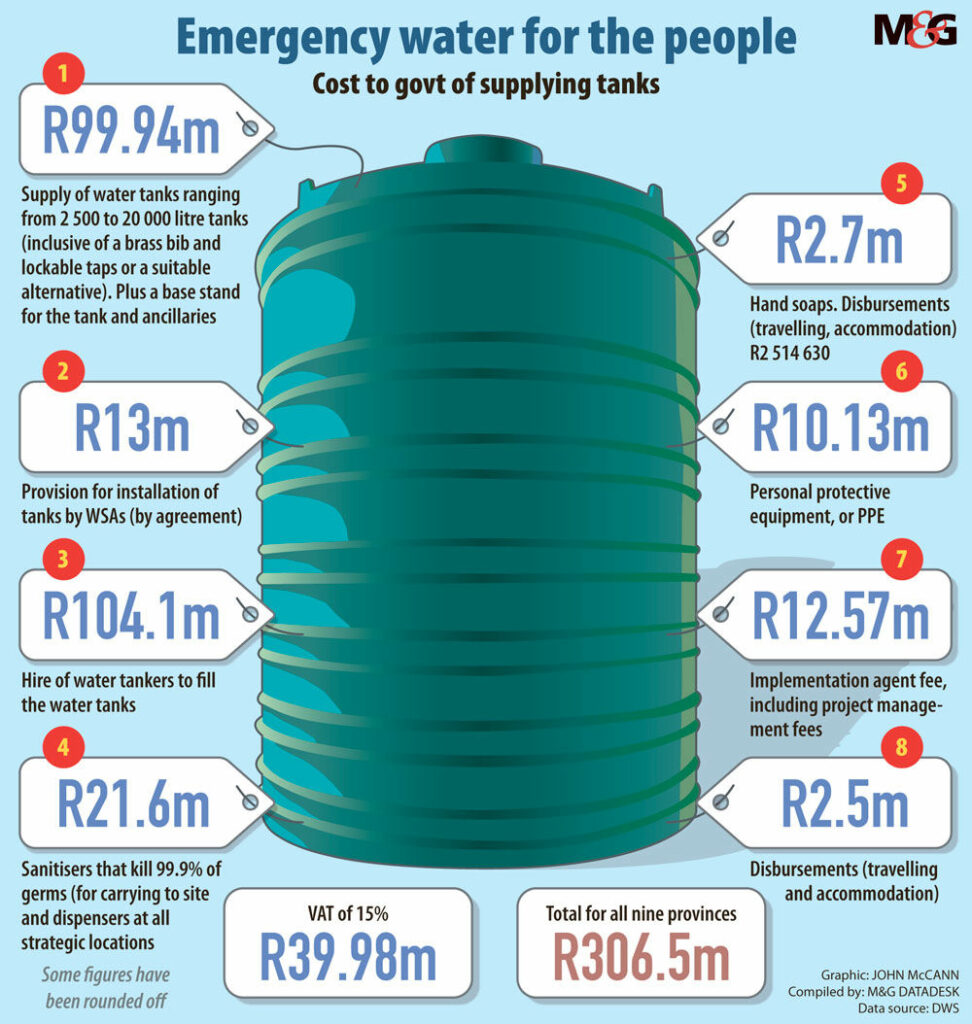Water is life and every drop counts, so it is important that we treat water and water resources as our most treasured resources.
Millions of rands have been repriotised from about 70 water and sanitation projects to top up water shortages exposed by the Covid-19 pandemic.
This will result in about 70 bulk water and sanitation projects being delayed, which means that 21-million people around South Africa will continue to live without a regular and consistent supply of clean water.
When President Cyril Ramaphosa declared a national state of disaster, Human Settlements, Water and Sanitation Minister Lindiwe Sisulu said it was crucial that people got water. Her quick-fix solution has been to buy 18 875 water tanks at a cost of R99.9-million. It will cost a further R104-million to fill the tanks. On top of this is R12.5-million to be paid to implementing agents. And R21.6-million will be spent on sanitisers.
875 water tanks at a cost of R99.9-million. It will cost a further R104-million to fill the tanks. On top of this is R12.5-million to be paid to implementing agents. And R21.6-million will be spent on sanitisers.
Presenting details of these interventions to its parliamentary committee earlier this week, the department said the treasury had granted them R306-million of its 2019/2020 Regional Bulk Infrastructure Grant (RBIG).
The department added that it needs more than R830-million for Covid-19 interventions, and that it is trying to get the treasury to reallocate more funds.
In other words, 21.5% of 2020/2021’s grant allocation will instead be used for further Covid-19 interventions.
The department admitted that: “The RBIG projects earmarked to be completed during financial year 2020/21 and subsequent years will be delayed, naturally delaying the impact to the community the grant is meant to service. The annual performance plan for 2020/21 will be affected and targets will need to be revised, as fewer projects can be implemented.”
Anthony Turton, a scientist specialising in water resource management, said the plan filed by the department has too much expenditure and less of a focus on the end-user.
“Once again the bankrupt department is throwing obscene amounts of money at procuring things. There is nothing that states if a technical assessment was conducted in many of the areas these tankers are going to.”
 (John McCann/M&G)
(John McCann/M&G)
He said this has happened before, with tanks and pipes going to areas but no water flows. “I’ve seen many of these projects and during this pandemic, I think we are doing the same thing without a structured and well thought out plan to ensure that there is a sustainable water future for areas in a water crisis.”
Connie Nagiah, a member of the Women’s Solidarity Forum, said there are 24 villages, townships and informal settlements around the country that are still struggling for water.
“These communities have had this burden before Covid-19 and we are calling on the minister at this time when there are funds set aside to prioritise these areas,” she said.
Nagiah added that the Covid-19 outbreak has only contributed to a mounting health crisis.
Delayed bulk projects
The report to Parliament notes that Eastern Cape has the majority of the projects that will be affected by a reduction in its RBIG allocation. The province had been allocated a budget of R377-million for the 2020/2021 financial year. Now that budget has been slashed by about R80-million.
For years the Makana area in the Eastern Cape has been battling with drought and a water shortage. It is in a crisis. Four projects in the area will be affected when about R42.8-million will be offset to provide Covid-19 interventions.
The Giyani water project in Limpopo will also be affected by the redirecting of funds. The department had budgeted R114-million for the Giyani Bulk Water Supply Drought Relief project and R219-million for water services. Combined, R137 million will be used for Covid-19 interventions. According to the department, the first project will not be completed by it’s target date of 2021/2022.
The Giyani water projects have already been hit by constant delays and myriad allegations of corruption.
In February members of the the portfolio committee on human settlements, water and sanitation visited villages in the Giyani area and were disappointed by the lack of progress. The department and the implementing agent, Lepelle Northern Water, had said the villages had running water. But the taps were dry.
“We left Giyani dejected by the state of affairs, as villagers continue to suffer the hardship of lack of water despite the huge investment that has been made through the fiscus. It is unacceptable that the people of Giyani have not experienced tangible impact proportional to the investment made,” Machwene Semenya, the chairperson of the committee, said in a parliamentary statement.
Other projects that will be affected include the Madibeng bulk water supply in the North West, the Upington wastewater treatment works, projects in Clocolan and Senekal in the Free State and the Sebokeng wastewater treatment works, which was budgeted R263-million but has now been reduced to R112-million.
The largest contributors to the Covid-19 interventions are Gauteng, which is cutting R280-million from its budget, followed by Limpopo, where R158-million has been cut from its allocation. The Free State budget has been reduced by R157-million.